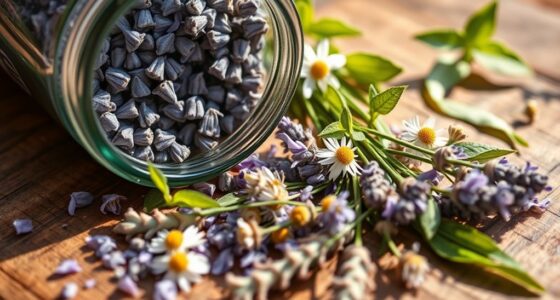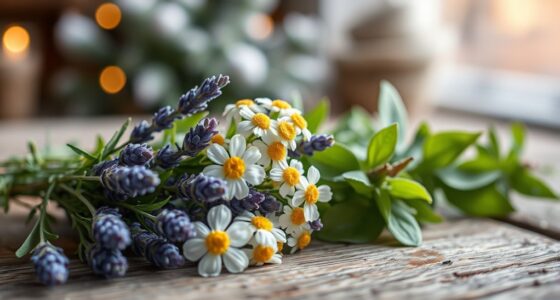Herbal remedies like teas and probiotics can support your gut-brain connection, improving your mood naturally. By promoting a healthy balance of gut bacteria and calming your digestive system, these remedies help boost neurotransmitter production and reduce stress. Regular use of herbal teas like chamomile or peppermint, along with probiotic strains, can foster mental clarity and a calmer mind. Continue exploring to discover how these simple practices can enhance your overall well-being.
Key Takeaways
- Herbal teas like chamomile, peppermint, and ginger can promote relaxation and reduce stress, supporting mood improvement.
- Probiotic strains such as Lactobacillus and Bifidobacterium help balance gut bacteria, positively influencing mental health.
- Consuming herbal remedies and probiotics together strengthens the gut-brain connection, enhancing mood and mental clarity.
- Regular intake of gut-supportive herbs and probiotics can decrease anxiety and promote a calmer, more stable mood.
- An integrative approach combining herbal teas and probiotics offers a natural, non-medication strategy for improving mental well-being.

Your gut and brain are more connected than you might think, forming a complex network that influences your mood, mental clarity, and overall well-being. This connection, often called the gut-brain axis, means that what’s happening in your digestive system can directly impact your mental health. One way to support this link is by choosing the right probiotic strains, which can help balance your gut bacteria and promote better communication between your gut and brain. Certain probiotic strains, like Lactobacillus and Bifidobacterium, have been shown to reduce anxiety and improve mood by enhancing gut health. When these beneficial bacteria thrive, they produce neurotransmitters and other chemicals that influence your brain, leading to a more stable mood and clearer thinking.
Balancing gut bacteria with probiotic strains supports mood, mental clarity, and overall well-being.
In addition to probiotics, herbal teas serve as simple yet effective remedies to nurture this connection. Many herbal teas, such as chamomile, peppermint, and ginger, have calming or anti-inflammatory properties that support gut health and, consequently, mental well-being. For example, chamomile tea is known for its soothing effects and can help reduce stress, which benefits your gut-brain communication. Peppermint tea aids digestion and relieves bloating, helping you feel more comfortable and less anxious. Ginger tea, with its anti-inflammatory properties, can improve digestion, reduce nausea, and promote a balanced gut environment, all of which positively influence your mood.
Supporting the gut-brain axis through targeted dietary choices can help optimize your overall mental health. By incorporating these elements into your daily routine, you can create a cycle of positive feedback between your gut and brain. Drinking herbal teas regularly not only offers comfort and relaxation but also encourages a healthy gut microbiome, especially if paired with probiotic-rich foods or supplements containing targeted probiotic strains. Remember, the effects aren’t instant, but over time, you may notice better mental clarity, reduced stress levels, and an overall uplift in mood.
The synergy between probiotic strains and herbal teas forms a gentle yet powerful approach to improving mental health through natural means. You’re supporting your gut’s microbial diversity while soothing your nervous system, creating a balanced environment for both your gut and brain to thrive. This holistic approach can be an effective way to manage everyday stressors and enhance your mood without relying solely on medication. With consistent effort and mindful choices, you can strengthen this connection, leading to improved mental clarity, a calmer mind, and a happier you.
Frequently Asked Questions
Are Herbal Remedies Suitable for All Mental Health Conditions?
You might wonder if herbal remedies suit all mental health conditions. The truth is, herbal efficacy varies across the mental health spectrum; they can help some individuals but not others. It’s crucial to consult a healthcare professional before trying herbal solutions, especially if you’re dealing with severe or complex issues. Herbs may complement traditional treatments but aren’t a one-size-fits-all cure, so personalized advice ensures safety and effectiveness.
How Long Does It Take to See Herbal Effects on Mood?
They say patience is a virtue, and that’s true for herbal remedies. The herbal onset varies, but generally, you might start noticing mood improvement within a few days to a few weeks. The mood improvement timeline depends on factors like dosage, individual biology, and consistency. Stick with your regimen, and remember, herbal remedies often work gradually—so don’t expect overnight results, but stay hopeful for steady progress.
Can Herbal Treatments Replace Conventional Mental Health Medications?
You might wonder if herbal treatments can replace conventional mental health medications. While some herbs, at the right dosage, can support your mood, they shouldn’t substitute prescribed medications without your doctor’s approval. Remember, the placebo effect can influence perceived benefits, so make certain you’re using herbs responsibly. Always consult a healthcare professional to determine if herbal remedies are suitable and safe for your specific needs.
Are There Potential Side Effects of Herbal Remedies on Digestion?
Herbal remedies are like a double-edged sword, offering benefits but also potential risks. You should be aware of herbal safety and possible digestive reactions, such as nausea or bloating. While many herbs are gentle, some can disrupt your digestion or interact with medications. Always consult a healthcare professional before starting new herbal treatments, so you can enjoy their benefits without unexpected side effects.
Do Herbal Remedies Interact With Other Medications?
When considering herbal remedies, you should be aware of drug interactions that might occur, especially if you’re on other medications. These interactions can alter how your medicines work or increase side effects. Always check dosage considerations and consult your healthcare provider before adding herbs to your routine. Staying informed helps you prevent adverse effects and ensures safe, effective use of herbal remedies alongside your prescribed treatments.
Conclusion
By now, you can see how your gut, brain, and herbs form a delicate dance, each influencing the other like a finely tuned orchestra. Incorporating herbal remedies might just be the key to tuning your mood and restoring balance. Think of your gut as the garden, your mind as the weather, and herbs as the gentle rain that helps everything flourish. Embrace this connection, and watch your happiness bloom from within.










